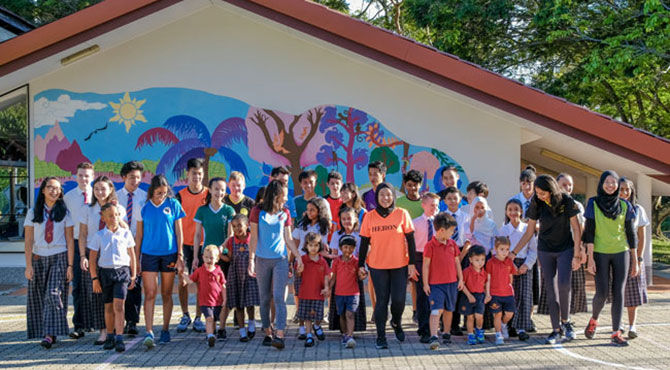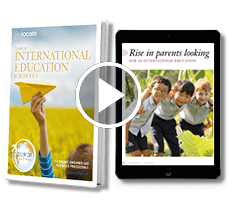Brunei: a destination for world-class education
With a strong export trade, high per capita incomes for residents and excellent business rankings and a wonderful natural habitat to explore, Brunei is a popular destination for globally mobile professionals and their families. We find out more about the country as well as its high-quality education system and international schools.
A good relationship with the UK
Brunei Darussalam has historically gained its wealth as an oil-rich country. Thus, The oil and gas sector is very significant, as well as new developments in related areas such as a new refinery and the Brunei Fertiliser Plant opening in 2020. The country gained independence from the UK in 1984, but retains a strong relationship with the UK and a British Garrison is based there. Brunei’s economic development is guided by the Brunei Vision 2035 plan drawn up by the government, which maps out the country’s vision for extensive economic diversification over the next 16 years. The plan includes strengthening and solidifying the oil and gas sector, which remains the backbone of the country’s economy, but is also an important enabler for economic diversification through direct foreign investment into other areas such as technology, business services and tourism. A range of industry sectors are represented across aerospace and defence, agribusiness, construction, petrochemicals, energy, environmental technologies, food processing and packaging, health technologies and financial services. Foreign companies and international employees are drawn to the country, which is seen as strategically located and stable under the Sultan’s leadership. Residents of Brunei enjoy one of the highest per capita incomes in the region and the world and its stability, low tax rates, robust legal framework to protect investors, excellent education environment and good communication and transport infrastructure, make it a top investment destination for companies from around the world.This is also reflected in the country’s improved standings in the Doing Business rankings, which are produced annually by the World Bank – Brunei has improved its rankings from 105th place in 2015 to 56th in 2018 and was the most improved country for two years in a row.
The plan includes strengthening and solidifying the oil and gas sector, which remains the backbone of the country’s economy, but is also an important enabler for economic diversification through direct foreign investment into other areas such as technology, business services and tourism. A range of industry sectors are represented across aerospace and defence, agribusiness, construction, petrochemicals, energy, environmental technologies, food processing and packaging, health technologies and financial services. Foreign companies and international employees are drawn to the country, which is seen as strategically located and stable under the Sultan’s leadership. Residents of Brunei enjoy one of the highest per capita incomes in the region and the world and its stability, low tax rates, robust legal framework to protect investors, excellent education environment and good communication and transport infrastructure, make it a top investment destination for companies from around the world.This is also reflected in the country’s improved standings in the Doing Business rankings, which are produced annually by the World Bank – Brunei has improved its rankings from 105th place in 2015 to 56th in 2018 and was the most improved country for two years in a row.Strong foreign trade
Despite being such a small country Brunei nevertheless exports goods produced in nine different industrial sites to ports all over Asia, including: China, Singapore, Hong Kong, Malaysia, the Philippines and Thailand, as well as to Australia and New Zealand.Brunei acknowledges Free Trade Agreements (FTAs) as a vital part of foreign trade policy and operates a relatively free and open trading regime using a small but highly educated workforce, ensuring that it has access to wider markets around the world.Business sectors in Brunei include the fast-growing Halal industry providing food, pharmaceuticals and cosmetics to the Muslim market, which make up a quarter of the global population. A rapid improvement in broadband and mobile phone services in the country has also led to the government championing opportunities for local digital media startups in a concept entitled ‘the Internet of Things’ (IoT) which should, in turn, benefit all areas of business, government and consumers. With global companies such as Siemens, which focuses on the areas of electrification, automation and digitisation, and the Chinese telecoms giant Huawei, already well established in the country, the outlook for students studying in Brunei to train and gain experience with such companies is increasing.Education in Brunei
Looking to the future, the government is taking a proactive approach to education by employing eight educational tools and approaches to strengthen Brunei’s education system. These tools range from investing in early childhood education and adopting international best practices in teaching and learning, through to strengthening and integration of ICT into the school curriculum and devising programmes to promote life-long learning and widening access to higher education.The education system offers a wide range of school options for both residents and expat families alike, including Arabic and religious schools, international schools and technical and vocational schools.For relocating families, the two international schools probably provide the best option for children to follow internationally recognised education programmes. International School Brunei (ISB) has been established for more than 50 years and is attended by students from over 40 nationalities who are taught by an equally diverse and highly experienced international staff. It has a strong academic record, following both the IGCSE (and latterly the accelerated IGCSE) and the International Baccalaureate (IB) Diploma programmes. Over 90 per cent of ISB graduates are accepted to top universities all around the world, from the UK, USA and Canada through to Australia.Jerudong International School (JIS)
Opened in 1997, Jerudong International School occupies a 120-acre coastal campus and is a boarding and day school offering a full range of international curriculums including: IGCSEs and A Levels and the International Baccalaureate (IB) Diploma. The school caters for 1,650 students from 54 countries – 40 per cent of the school are Bruneian students – with a staff of 200 qualified teachers. The majority of the teaching staff are from the UK, though a small percentage are from Australia, Canada, New Zealand and South Africa. Facilities include 26 science laboratories, an extensive performing arts centre, two swimming pools, three sports centres as well as an onsite medical centre and Outdoor Discovery Centre.Nicholas Sheehan, principal, explains how the school is preparing students for the challenges of a global career. He says, “Jerudong International School provides students with a solid academic foundation so that students have the exam results required to apply to the world’s best universities. However, within the academic curriculum and also in addition to it, we implement a range of programmes and extra-curricular activities to challenge and inspire students - providing them with leadership opportunities and the critical thinking skills, tools and confidence to be able to adapt to the different environments they will find themselves in the future. “JIS is a member of the UK-based Headmasters’ and Headmistresses’ Conference (HMC) organisation, the Council of British International Schools (COBIS), the Federation of British International Schools in Asia (FOBISIA) and the Boarding Schools’ Association (BSA).The school offers a strong co-curricular programme including a wide range of sports and activities including the Duke of Edinburgh Award and Model United Nations club.“As a school of more than 1,650 students, with 40 per cent Bruneians and 60 per cent students from 54 other countries, fostering global mindedness is a crucial part of the school mindset. Internationalism is a key part of the IB Diploma programme curriculum, but it is something we integrate with all areas of the curriculum from the very youngest children in Junior School to the senior students. It enables our graduates to apply to the very best Universities in full confidence that they have the academic foundation and emotional resilience to thrive in their new place of study,” adds Sheehan.Students from JIS go on to study at some of the world’s leading universities including Cambridge, Imperial College and LSE in the UK, the University of California (Berkeley) in the US, Melbourne University in Australia and the University of British Columbia in Canada.Safety & security
Jerudong International School views safeguarding as the very highest priority. Nicholas Sheehan, principal, says “The children in our care should be safe and secure so they can focus on developing in every way. The school works closely with the Brunei government and also key embassies to ensure that staff within the school are highly trained and knowledgeable with regards to safeguarding. All staff are checked and screened. Access to the school campus is closely guarded. There are strict policies and procedures in place regarding children being put on social media.” This article is from Relocate Global's Guide to International Education & Schools 2019/20 which is packed with expert tips and information for those relocating and the professionals supporting them. For volume options, co-branded editions, digital or online licence agreements and advertising opportunities, contact Fiona Murchie at +44 (0)1892 891334 or email fiona@relocatemagazine.comNow available as an ebook on Amazon! Simply download from Amazon onto your Kindle, mobile phone or tablet to read wherever you are!
Subscribe to Relocate Extra, our monthly newsletter, to get all the latest international assignments and global mobility news.Relocate’s new Global Mobility Toolkit provides free information, practical advice and support for HR, global mobility managers and global teams operating overseas.
 Access hundreds of global services and suppliers in our Online Directory
Access hundreds of global services and suppliers in our Online Directory For more education and school-related news, visit our Education and Schools pages.© 2019. This article first appeared in the 2019/20 edition of the Guide to International Education & Schools published by Relocate Global, Spray Hill, Hastings Road, Lamberhurst, Kent TN3 8JB. All rights reserved. This publication (or any part thereof) may not be reproduced in any form without the prior written permission of Relocate Global. Relocate Global accepts no liability for the accuracy of the contents or any opinions expressed herein.
For more education and school-related news, visit our Education and Schools pages.© 2019. This article first appeared in the 2019/20 edition of the Guide to International Education & Schools published by Relocate Global, Spray Hill, Hastings Road, Lamberhurst, Kent TN3 8JB. All rights reserved. This publication (or any part thereof) may not be reproduced in any form without the prior written permission of Relocate Global. Relocate Global accepts no liability for the accuracy of the contents or any opinions expressed herein.©2026 Re:locate magazine, published by Profile Locations, Spray Hill, Hastings Road, Lamberhurst, Kent TN3 8JB. All rights reserved. This publication (or any part thereof) may not be reproduced in any form without the prior written permission of Profile Locations. Profile Locations accepts no liability for the accuracy of the contents or any opinions expressed herein.





























